Did you know that Virginia recognized April as Arab American Heritage Month long before it became a national designation in 2022? You can help celebrate the many cultures represented by Arab Americans by exploring the wealth of literature and poetry held by the University of Virginia Library. We’ve enlisted the efforts of UVA graduate students Gretchen Masse and Katelyn Eschmann and librarians Leigh Rockey and Amy Hunsaker. All are avid readers who are excited to share their reviews of old favorites and new discoveries.
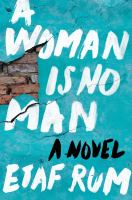 “A Woman is No Man,” a New York Times bestseller, is Palestinian-American author Etaf Rum’s first novel. It moves in and out of the past and present as it beautifully interweaves the story of Isra, a young Palestinian woman who moves to New York for an arranged marriage, and her daughter Dreya. Dreya is now a teenager seeking to recover the truth of the untimely death of her parents. As Dreya faces the prospect of an arranged marriage, she grapples with her own ambitions for an independent identity and the expectations and needs of her family — similar to her mother’s journey. Rum highlights the mother/daughter bond while also uncovering the traumatic danger of family secrets. “A Woman is No Man” is a moving, challenging read for all interested in a woman’s right to self-determination and freedom, and the specific nature that journey takes when a woman must navigate both a new, foreign culture and traditional, patriarchal customs. (Katelyn Eschmann)
“A Woman is No Man,” a New York Times bestseller, is Palestinian-American author Etaf Rum’s first novel. It moves in and out of the past and present as it beautifully interweaves the story of Isra, a young Palestinian woman who moves to New York for an arranged marriage, and her daughter Dreya. Dreya is now a teenager seeking to recover the truth of the untimely death of her parents. As Dreya faces the prospect of an arranged marriage, she grapples with her own ambitions for an independent identity and the expectations and needs of her family — similar to her mother’s journey. Rum highlights the mother/daughter bond while also uncovering the traumatic danger of family secrets. “A Woman is No Man” is a moving, challenging read for all interested in a woman’s right to self-determination and freedom, and the specific nature that journey takes when a woman must navigate both a new, foreign culture and traditional, patriarchal customs. (Katelyn Eschmann)
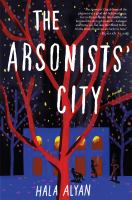 “The Arsonists’ City” by Hala Alyan is one family’s story written across Brooklyn, Damascus, Beirut, Austin, and a small California town called Blythe. Of course, these locations function as characters, but they never distract from the engaging and sometimes enraging ancestral drama. You get to know each member of the family well, going inside everyone’s story while they struggle with secrets and gather for what might be the last time at the family homestead in Lebanon. This novel is Alyan’s second, following the amazing “Salt Houses,” and it’s worth everyone’s time. (Leigh Rockey)
“The Arsonists’ City” by Hala Alyan is one family’s story written across Brooklyn, Damascus, Beirut, Austin, and a small California town called Blythe. Of course, these locations function as characters, but they never distract from the engaging and sometimes enraging ancestral drama. You get to know each member of the family well, going inside everyone’s story while they struggle with secrets and gather for what might be the last time at the family homestead in Lebanon. This novel is Alyan’s second, following the amazing “Salt Houses,” and it’s worth everyone’s time. (Leigh Rockey)
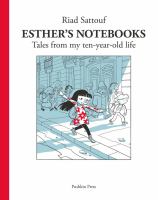 In “Esther’s Notebooks: Tales from My 10-Year-Old Life,” Riad Sattouf, author of the memoir “The Arab of the Future,” based his main character Esther on his daughter’s friend. Every week he would chat with her and from those conversations grew a comic series. Each of the 54 pages of this graphic novel is a self-contained story about a week in the life of its protagonist. This is the first book in a series that stretches four more years to a 14-year-old Esther in France. Esther is eminently relatable and Sattouf’s writing is a highlight of the Arab diaspora. (Gretchen Massey)
In “Esther’s Notebooks: Tales from My 10-Year-Old Life,” Riad Sattouf, author of the memoir “The Arab of the Future,” based his main character Esther on his daughter’s friend. Every week he would chat with her and from those conversations grew a comic series. Each of the 54 pages of this graphic novel is a self-contained story about a week in the life of its protagonist. This is the first book in a series that stretches four more years to a 14-year-old Esther in France. Esther is eminently relatable and Sattouf’s writing is a highlight of the Arab diaspora. (Gretchen Massey)
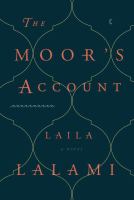 Laila Lalami is one of my favorite Arab American authors, but before this year, I had never read her brilliant fictional memoir, “The Moor’s Account,” which was a Pulitzer Prize for Fiction finalist in 2015. The story is based on true characters who were involved with the disastrous Narváez expedition that began in Florida in 1527. Our narrator and protagonist is the Moroccan slave Mustafa (called Estebanico by the Spanish), considered to be the first Black explorer of the Americas. Lalami’s use of language allows the reader to view the events from the perspective of a 16th-century Muslim man who is forced to participate in the Spanish invasion of indigenous American settlements and left to survive in a brutal wilderness after the expedition fails. The real events of the story took place over the span of a decade, but the narrative propels the reader forward so that it is nearly impossible to put the book down, even if it’s 1:30 a.m. and the reader needs to work in the morning. (Amy Hunsaker)
Laila Lalami is one of my favorite Arab American authors, but before this year, I had never read her brilliant fictional memoir, “The Moor’s Account,” which was a Pulitzer Prize for Fiction finalist in 2015. The story is based on true characters who were involved with the disastrous Narváez expedition that began in Florida in 1527. Our narrator and protagonist is the Moroccan slave Mustafa (called Estebanico by the Spanish), considered to be the first Black explorer of the Americas. Lalami’s use of language allows the reader to view the events from the perspective of a 16th-century Muslim man who is forced to participate in the Spanish invasion of indigenous American settlements and left to survive in a brutal wilderness after the expedition fails. The real events of the story took place over the span of a decade, but the narrative propels the reader forward so that it is nearly impossible to put the book down, even if it’s 1:30 a.m. and the reader needs to work in the morning. (Amy Hunsaker)
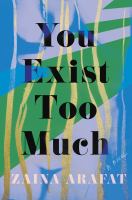 You can make jokes about 1980s pop hits, but the protagonist of Zaina Arafat’s “You Exist Too Much” is, in fact, addicted to love. This addiction is very real, and it’s ruining her life. Why is it happening? What do her formative gender experiences in Palestine have to do with her current troubles? The interplay of her relationships and her obsessions degrades her lived experience until she seeks treatment and works to find healthy connections with her lovers. Meanwhile, the reader careens around life with her, hoping that meaningful bonds will form out one of her affairs, as long as it’s not that total loser Matias, please. (Leigh Rockey)
You can make jokes about 1980s pop hits, but the protagonist of Zaina Arafat’s “You Exist Too Much” is, in fact, addicted to love. This addiction is very real, and it’s ruining her life. Why is it happening? What do her formative gender experiences in Palestine have to do with her current troubles? The interplay of her relationships and her obsessions degrades her lived experience until she seeks treatment and works to find healthy connections with her lovers. Meanwhile, the reader careens around life with her, hoping that meaningful bonds will form out one of her affairs, as long as it’s not that total loser Matias, please. (Leigh Rockey)
Want to explore more? Here are some great resources to learn more about Arab American issues, literature, and culture:
- Arab American National Museum: https://arabamericanmuseum.org/
- Arab America: https://www.arabamerica.com/
- Arab American Institute: https://www.aaiusa.org/
